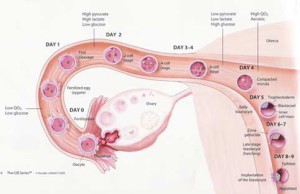A woman goes through 4 phases during her menstrual cycle; Menstrual Phase, Follicular Phase, Ovulatory Phase and Luteal Phase. Irregularities of menstrual cycle, in particular the ovulatory phase can drastically effect conception
Menstrual phase is characterised by the uterus shedding its lining. This occurs after an egg has failed to implant into the uterus.
Follicular phase: This phase is characterised by the development of eggs in the ovary. One of these eggs matures in a sac-like-structure called a follicle. This follicle develops and secretes a hormone which causes the uterine wall (endometrium) to thicken, preparing for egg implantation.
 Ovulatory phase: During this phase the body prepares to release an egg for fertilisation. Around day 14 of the menstrual cycle, the pituitary gland secretes a hormone called the Luitenising hormone (LH). This hormone causes the egg to be released from the ovary, allowing it to travel down the fallopian tubes for fertilisation. The egg is propelled down the fallopian tubes to the uterus by small hair like extensions called cilia of the fimbriae. The egg can stay in the fallopian tubes for up to 24 hours and can take up to 5 days to travel from the ovary to the uterus.
Ovulatory phase: During this phase the body prepares to release an egg for fertilisation. Around day 14 of the menstrual cycle, the pituitary gland secretes a hormone called the Luitenising hormone (LH). This hormone causes the egg to be released from the ovary, allowing it to travel down the fallopian tubes for fertilisation. The egg is propelled down the fallopian tubes to the uterus by small hair like extensions called cilia of the fimbriae. The egg can stay in the fallopian tubes for up to 24 hours and can take up to 5 days to travel from the ovary to the uterus.
The luteal phase starts on day 15 and lasts until the end of the menstrual cycle. This stage
focuses on preparing the uterus for fertilisation. Hormones; oestrogen and progesterone ensure that the endometrium remains lush to allow for implantation of a fertilised egg. If the egg has not been fertilised these hormone levels decline and the endometrium lining begins to shed, starting the menstrual phase.
Understanding your ovulatory cycle
Understanding your ovulatory cycle is vital when trying to conceive naturally. The average woman ovulates every 25 to 32 days but this cycle can vary from person to person. During ovulation the egg is in the optimal position for fertilisation. Predictor Ovulation allows you to test whether you are ovulating at the comfort of your own home. This test determines the best 2 days to conceive. If you have been unable to conceive naturally for an extensive period of time please visit your nearest doctor as you might have ovulatory dysfunction or fertility issues.
Ovulatory dysfunction is a condition whereby ovulation does not occur regularly or fails to occur at all. It is one of the main causes of female infertility. If a woman does not ovulate regularly she has fewer chances to conceive as she may ovulate less frequently. Irregular or late ovulation can affect the quality of eggs available for fertilisation. The main causes for ovulatory dysfunction include:
- Ageing: As you age, the number of eggs available for fertilisation decline. When these levels are critically low, menstrual cycles may become irregular.
- Hormonal irregularities: Some women have irregular menstrual cycles because their ovaries produce too much androgen (male hormones). This condition is more common in women who are overweight, and have a history of irregular periods, acne, and/or infertility. This syndrome is called Polycystic Ovary Syndrome (PCOS) or PCO. This condition is often presents with cysts under the surface of the ovary. Women who have PCOS often need to be on treatment to regulate their menstrual cycles.
- Stress: Physical or mental stress can often cause ovulatory problems. Women under extreme mental stress (professional students or executive managers) often stop ovulating for short periods of time. This an-ovulation is usually temporary and usually cycles return to normal when the stressor is no longer present. Extreme weight loss or intense exercise (as in professional athletes) can also cause ovulatory dysfunction.
- Thyroid disorders: An over or under active thyroid can cause ovulatory problems. If a woman has been unable to fall pregnant after an extensive period of time she should speak to her doctor about testing her thyroid function. Proper treatment of a thyroid abnormality can often restore ovulation.
- Abnormal ovaries: Some women are born with ovaries that cannot produce eggs. Women with this condition do not go through puberty and usually never have a period.
- Phases of the Menstrual cycle. Last accessed 9 September 2014. http://menstrupedia.com/articles/physiology/cycle-phases
- Ovulatory Dysfunction. Last accessed 9 September 2014 http://www.centerforhumanreprod.com/ovulatory_dysfunction.html





